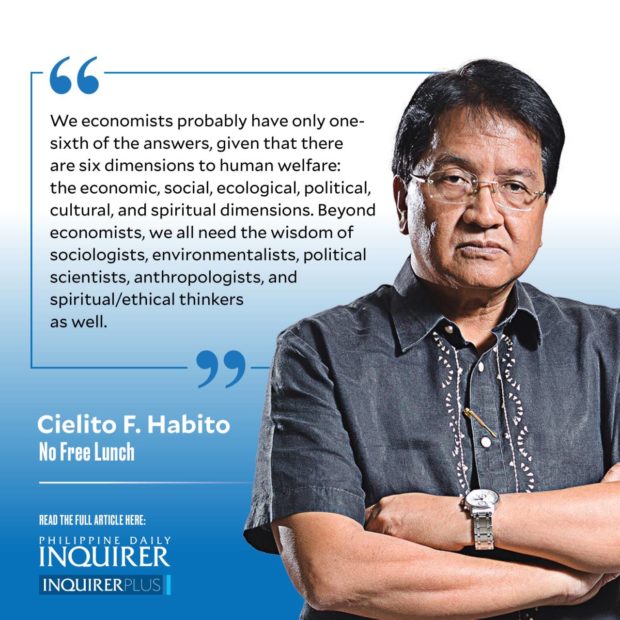Bridging silos
Since the first United Nations Conference on the Environment held in Stockholm in 1972, the Rio Earth Summit in 1992, and through all the related conferences that followed, a systemic barrier that has held back the world’s environment agenda is summed up in the four-letter-word “silo.” It seems natural for humans to think and work in silos, rather than have a holistic systems view of the problems we face, especially in the way we relate to our planet Earth.
Governments are organized into sectoral departments or ministries, with their heads often thinking their sector to be most important. As our country’s chief development planner in the 1990s, it was my challenge then to gently point out how everyone fits into the big picture of the overall Philippine Development Plan. I’ve also seen many of my professional colleagues think and behave like we economists had all the answers to the world’s problems. I’d rather more humbly accept that we economists probably have only one-sixth of the answers, given that there are six dimensions to human welfare: the economic, social, ecological, political, cultural, and spiritual dimensions. Beyond economists, we all need the wisdom of sociologists, environmentalists, political scientists, anthropologists, and spiritual/ethical thinkers as well.
Article continues after this advertisementOur solutions must not just be multisectoral but intersectoral, and not just multidisciplinary but interdisciplinary in nature. The difference between the two prefixes is important, because the right solutions are not additive, but rather, integrative in nature. How, then, can we effectively address the triple planetary crises of climate change, biodiversity loss, and pollution, if each government entity, each business enterprise, and even each civil society group is accustomed to thinking and working in silos?
The 1992 Rio Earth Summit recommended the establishment of multistakeholder national councils for sustainable development (NCSDs), to provide the venue for high-level coordination across government departments, business, and civil society. We were the first country in the world to do so after Rio, as one of President Fidel V. Ramos’ first executive orders created the Philippine Council for Sustainable Development with members from the government, civil society, and business—our first such high-level body with a multistakeholder membership. More than 50 countries had since set up similar entities. But many appear to have gone inactive or defunct, including ours, after seeing peak activity in the 1990s. It was, and still is, a promising way to achieve intersectoral and interdisciplinary coordination for the environment, but it seems that silo mentality is such a formidable force that even the NCSD idea finds hard to overcome.
How, then, do we move forward? The biggest barrier to bridging the silos is communication. My organization Brain Trust Inc. has proposed to make full use of the tools of the digital information age as the bridge. Pooling private business sector and government resources together, we could set up a comprehensive online platform to provide a common venue to: (1) Collate and disseminate information and knowledge that all those working on these issues could find useful; (2) Register and take stock of all proposed and ongoing environmental initiatives by all groups in all areas of the country, thereby facilitating identification of gaps that need to be filled; (3) Facilitate and foster linkages, coordination, and partnerships among groups pursuing related and complementary initiatives; (4) Link potential funders to proponent groups with worthy concrete initiatives; and (5) Sustain a discussion forum that would help bridge people and entities from various sectors and disciplines toward developing holistic and integrative approaches and solutions.
Perhaps, coordination and holistic integration of efforts that had eluded the NCSDs could stand a much better chance of being achieved in virtual space, under the digitally empowered new normal. If the nongovernment sectors could provide the stronger impetus, it could be a mechanism that, unlike NCSDs, could well survive changes in government and political winds.

















